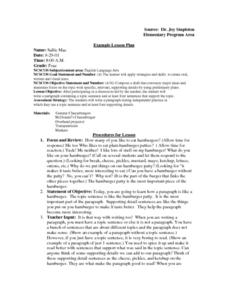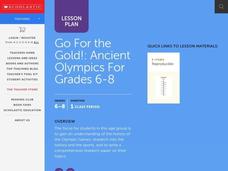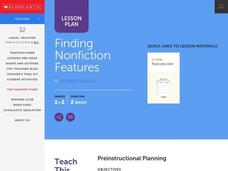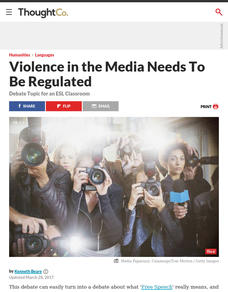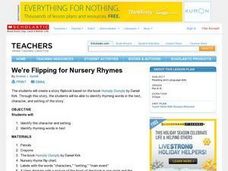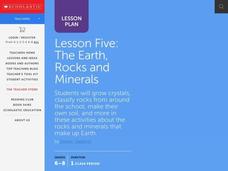Curated OER
Well-behaved Women [and Men] Seldom Make History
Students examine historical context. In this historical perspectives lesson, students read and discuss instructor-selected picture book biographies. Students then complete graphic organizers based on the challenges the main characters...
Curated OER
Hamburger Paragraphs
Fourth graders discuss who likes hamburgers. Students listen as the teacher compares the hamburger to a paragraph, and the hamburger patty to the topic sentence. The class works together to write a paragraph. The teacher provides gummy...
Curated OER
Enriching Student Inquiry into Endangered Animals
Students read aloud novel Hoot, by Carl Hiassen, choose endangered animal, complete individual research projects related to their interest, prepare persuasive writing piece, and compare and contrast two endangered animals.
Curated OER
Interdependence: A Colonial Example
Students complete a variety of activities related to Colonial America and how people lived at that time. They conduct research on a selected colonial trade and present an oral report as role-playing that craftsman, and participate in a...
Curated OER
Go For the Gold!
Students are introduced to the history of Greece and the Olympic Games and then research the history and sports in order to write a research paper. They make connections between the 2004 Olympics and the past Olympic Games and interpret...
Curated OER
Writer's Notebook and Haiku
Students, after viewing various examples from students around the world, as well as writing in their Writer's Notebook, create, compose and revise a Haiku poem that sketches a "snapshot" or image in time. They incorporate the theme or...
Curated OER
Costa Rican Sea Turtles
Young scholars read "One Tiny Turtle" by Nicola Davies. Using the internet, they research the characteristics of turtles off of the Costa Rica coast. In groups, they complete a worksheet and define vocabulary words they are unfamiliar...
Curated OER
The Stroop Effect
Students explore the specific areas of the brain that process different types of information. They examine processing conflicts. Students participate in a hands-on minds-on activity using the Stroop Effect. They design psychological...
Curated OER
Finding Nonfiction Features
Young scholars review the differences between a fiction and non-fiction book. In groups, they use different non-fiction books to identify the eleven features that distinguish it from a fiction book. To end the lesson, they create a...
Curated OER
The Aftermath of Genocide
Students read and discuss articles written about the Rwandan genocide. They participate in a class discussion, and write a letter to the U.N. or a letter to the editor of their local newspaper.
Curated OER
A New Federation
Students describe the relationships between state and federal parliaments in Australia. They identify responsibilities shared between federal and state and territory governments. Students explore an alternative federal structure by...
Curated OER
Prefixes: ab- and be-
In this recognizing the meanings and usages of the prefixes ab- and be- worksheet, students write the meanings of the base words, add the prefixes to make new words, and write the meanings of those word. Students write 18 answers.
Curated OER
Marine Life, Oceans, Lakes and Rivers
Students examine the types of organisms found in oceans. In groups, they read articles about the research done at certain sites. They work together to research their own water ecosystems and report the findings to the class. To end...
Curated OER
Discovering Flight
Students discuss what wind can do such as cause a ball to roll, a book to open, water to move. They observe in the book, "Up, Up and Away!: the Sciene of Flight" things that fly and begin brainstoring things on paper that can fly. They...
Curated OER
D'Nealian Cursive Writing
In this cursive writing worksheet, 3rd graders improve on their cursive writing skills. Students practice their cursive by writing the lowercase letter ten times.
Curated OER
Much Ado About Something (Lesson 6)
View a video clip about Shakespeare's work. Identify the ambiguities in his texts. Practice reading well-known soliloquies.
Curated OER
The O.J. Verdict
High schoolers research the main points of the accusations against O.J. Simpson, the prosecution and defense strategies and the outcome of the infamous murder trial. They participate in a mock trial, view a film, read articles and...
Curated OER
Conversation Lesson: Multinationals - Help or Hindrance?
Students engage in a debate regarding the status of nationals versus multinationals as a way of improving their conversation skills. The format for the debate is imbedded in this plan.
Curated OER
New Creations from Six Simple Machines
Students explore different types of simple machines and research the concepts of force, effort, and work. They conduct Internet research and complete a worksheet about examples of simple machines used in everyday life. Students also...
Curated OER
We're Flipping for Nursery Rhymes
Students read a variety of nursery rhymes with a focus on "Humpty Dumpty". While reading, they identify the words that rhyme along with the setting, plot and characters. To end the activity, they complete a Venn Diagram comparing...
Curated OER
Learning to Interview
Second graders watch simulated interview between the teacher and a student before they interview a classmate using the form provided. Next, they complete two interviews of family members at home. They focus on the concepts of ancestors...
Curated OER
Fibonacci and the Golden Number!
In this math patterns worksheet, students review the beginning numbers in Fibonacci's numbers, find the pattern, follow directions and problem solve to find the Golden Number and complete a chart, measure lengths of body parts and find...
Curated OER
Shooting Civilians
Young scholars examine world conflict issues. In this global conflict lesson, students listen to a story that puts them in the shoes of an army soldier ordered to shoot civilians. Young scholars discuss the plight of the soldier and...
Scholastic
Lesson Five: The Earth, Rocks and Minerals
Apply the principles of geology to a series of collaborative, hands-on class activities. Young earth scientists learn more about igneous, metamorphic, and sedentary rocks before classifying and weathering rocks that they find....


![Well-behaved Women [and Men] Seldom Make History Lesson Plan Well-behaved Women [and Men] Seldom Make History Lesson Plan](http://content.lessonplanet.com/resources/thumbnails/268494/large/odqwmdy4lmpwzw.jpg?1414466400)
